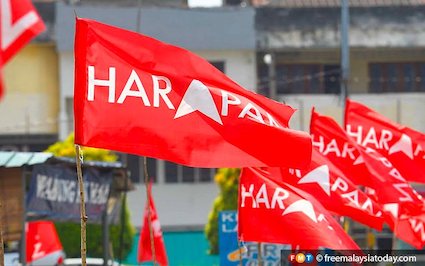Dennis Ignatius: End of the road for Pakatan Harapan?

Dennis Ignatius, The True Net
For the millions of Malaysians who supported PH, the unravelling of the coalition is a huge disappointment.
Parti Keadilian Rakyat’s (PKR) decision to ditch the Pakatan Harapan (PH) logo in favour of its own brand has finally blown the lid off long-simmering disagreements within the coalition. Paralysed by internal differences on issues of leadership and strategy as well as mutual suspicion and personal acrimony, PH is barely holding together.
Assurances by Anwar Ibrahim and other PKR leaders that PH remains as united as ever despite the use of separate logos are at odds with reality. The PH presidential council was evenly split on the issue – PKR and UPKO in favour; Amanah and DAP against. Both DAP and Amanah have since done little to hide their anger with PKR over the move. Penang deputy chief minister P Ramasamy, outspoken as always, slammed the move as “wrong and superficial”, adding that “if PKR does not trust the coalition’s logo, then what is the point of having the coalition in the first place?”
Whatever Anwar may say publicly, there is no escaping the fact that his party’s relationship with the DAP is in tatters. The animus against “the Lims” – Lim Kit Siang and Lim Guan Eng – is particularly evident. It is evident that PKR leaders remain bitter that the Lims were less than supportive of Anwar when he was challenging Tun Dr Mahathir for the top job in the waning days of the PH administration. They allege – and not without reason – that even when it became clear that Mahathir was up to his old tricks, the DAP continued to support Mahathir.
And later, when it became clear that Mahathir was finished, the Lims opted to support Warisan’s Shafie Apdal instead of Anwar.
DAP national organizing secretary Anthony Loke’s recent remarks that the PH coalition should not just be about Anwar becoming prime minister has further fuelled suspicions about the DAP’s commitment to Anwar.
Additionally, many in PKR have also come to the conclusion that being too close to the DAP is not helpful when it comes to soliciting Malay votes. Anwar himself hinted at this when he ruminated, in the wake of PH’s disastrous performance in Malacca, that his multiracial coalition had been unable to counter the narrative that the Chinese would dominate the country if PH returned to power. “We know that it is not true and we have denied this in the 22 months that we were in government but we have not been able to convince the people,” he said. Continuing, he added that “racial issues against the coalition had been too ingrained and difficult to shake off”.
His message was clear: the rejection of the DAP by Malay voters had hurt PH. It is an important issue for PKR as more than 50% of PKR seats are dependent on the Malay vote. As one source put it, it would be suicide to go into an election these days with the DAP as a partner. The use of the PKR logo in Johor is one consequence of this thinking.
It is quite apparent, therefore, that PKR is now intent on charting a more independent course in pursuit of its ‘reformasi’ agenda under Anwar’s leadership. Cooperation with other parties will be geared towards an agreement on seat allocations and premised upon parliamentary support for an Anwar administration. As one senior PKR leader put it, “It’s a separation, not a divorce.”
The DAP view of Anwar is no less charitable. Anwar is seen as someone who has lost his ability to inspire voters, lacks the skills to forge a broad-based coalition and provide compelling leadership. As Ramasamy bluntly put it, it’s about “the calibre of leadership…”. The call by another DAP stalwart to “put aside personal agendas so that we can push forward a more compelling strategy, with a larger political narrative put in place,” is yet another indication of the DAP’s frustration with Anwar’s leadership.
The upcoming Johor state elections will be an important barometer of the validity of all the arguments now in play. In 2018, PKR won 7 of the 12 seats it contested. This time it is hoping to contest in 20 seats. Even those within the party, however, are not too optimistic about their chances. If PKR performs as badly in Johor as it did in Malacca and Sarawak, Anwar’s leadership will again be called into question while the PKR brand itself will be further diminished.
For the DAP too, Johor will be crucial. In the 2018 state elections, it won all 14 of the seats it contested but, as both Malacca and Sarawak have shown, it has lost a lot of non-Malay support since. And this time around, the non-Malay vote might be even further divided, especially if no agreement is reached with Muda and Warisan on seat allocations.
What all this means is that a badly fractured opposition will be squaring off in Johor against an increasingly resurgent UMNO. Within both the DAP and PKR, there is nothing but gloom with many believing that not just Johor but GE15 itself might be lost already. Perhaps it will take a crushing electoral defeat for both parties to start reinventing themselves, bringing in a new generation of leaders and rebuilding cooperation.
For the millions of Malaysians who supported PH, the unravelling of the coalition is a huge disappointment. While Mahathir might have engineered the collapse of the PH administration, it’s disheartening that PKR and DAP – the main pillars of PH – have allowed their differences to get in the way of building that better Malaysia we all want to see.

